How a great-grandma navigated Detroit's bureaucracy to turn a hovel into a hunk of heaven
Georgia Taylor wasn't interested in wasting much of a beautiful spring day yakking with the candidate for Detroit City Council who darkened her door in May 2021.
The candidate introduced himself and asked his neighbor not what she could do for him, but what he could do for his neighbor.
The then-89-year-old great-grandmother's demeanor might best be described as tolerant, bordering on skeptical … maybe even cynical. Nevertheless, Taylor told the candidate she had been trying for years to get the city to tear down the raggedy house next door.
The red brick wreck sat between two homes on Eastlawn, a turd among tulips. Plywood had fallen from windows now staring at Taylor's tidy bungalow like the vacant eyes of a dopefiend. The shingles were a distant memory. Blue ribbons were all that remained of a tarp which had been stretched across now-warped and sunbleached boards as part of a futile bid to keep the rain out. What was once a home was now beyond hope, its desperate state reflected in a backyard that looked like a moonscape littered with weeds, rocks, trash and scrub trees protruding from the rutted ground at angles considerably less than 90 degrees.
Polite, but pointedly, Taylor asked the candidate: "Where do you live?"
"East English Village," the candidate said, referring to a neighborhood distinguished by its large Tudor-style homes located about 2 miles east of Taylor's modest Chandler Park neighborhood.
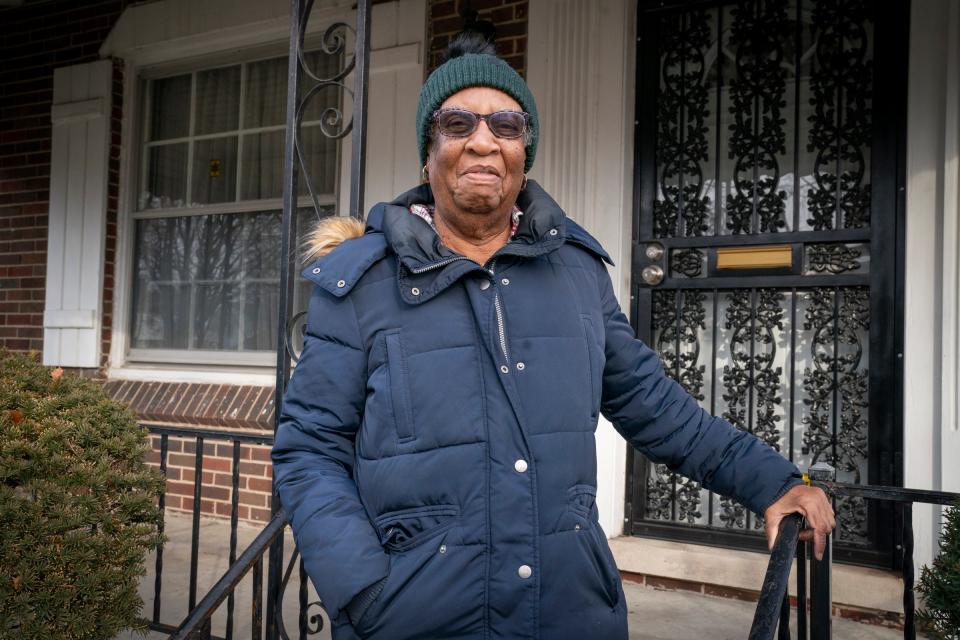
Taylor's tone was tinged with more than a hint of disgust that one of the have-mores was canvassing her neighborhood of have-lesses only because he needed help when she replied: "Everyone running for City Council lives in East English Village."
"That's true," the candidate said. "But I'm the only one who's going to mow that yard next door."
Both of them were sincere, but neither realized this was the start of an odyssey that would run far longer than the City Council campaign and, along the way, yield unexpected but useful insights into the city's sometimes byzantine real estate bureaucracy.
From home to hovel
Taylor's niece once owned the house next door. Now 91, Taylor doesn't know much about the folks who moved in after her niece moved to the South, but she's pretty sure they were squatters.
In December 2016, the home ended up in the hands of the Wayne County Treasurer. Less than a month later, it landed in the Detroit Land Bank's inventory.
By September 2017, the Land Bank turned the house over to a nonprofit organization under a program in which faith-based or community development organizations rehabilitate abandoned properties. Four months later, in January 2018, the nonprofit determined the home couldn't be saved. It began taking steps to demolish it.
By December 2018, for reasons that aren't exactly clear, the crumbling crib landed back in the Land Bank's lap. This typically happens when a building is too big, or the nonprofit's funds are too small. Either way, by March 2019, the Land Bank had inspected the hovel, determined it was a goner and put it on their demolition list. Four months later, the city boarded it up.
And then ... nothing.
Taylor, who moved to Eastlawn in 1972 with her husband and two sons, longed for the days when her block was a tight-knit street lined with neighbors who looked out for one another.
"We all kept it up," said Taylor, who loves flowers and takes pride in her meticulously groomed yard. "We had our little block club and we worked together."
Neighbors moved away. The house next door eventually ended up with a basement full of raw sewage.
"That's when I really started complaining," Taylor said. "Anybody I came across their number, I called."
She called the city ombudsman and the City Council. She went to the District 4 manager's office. Twice.
Even though the porch was caving in, neighborhood kids played at the house.
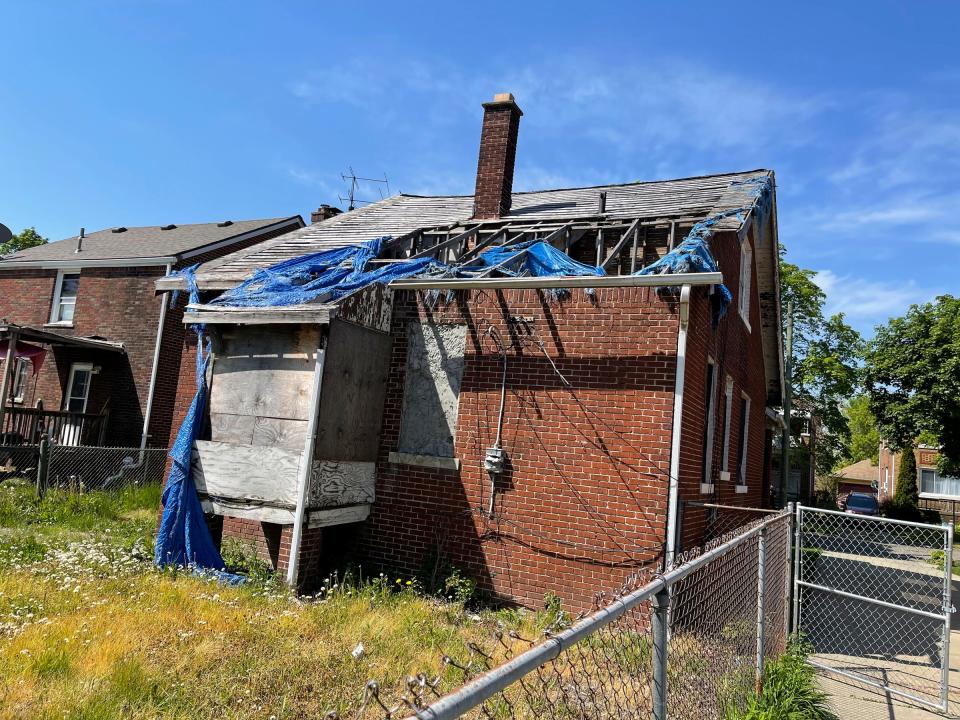
"I kept telling them that was a safety hazard," Taylor said. "But nobody listened."
She forbade her great-grandkids from playing next door. She sprayed the backyard for weeds. She had the grass cut.
"I paid for it out of my pocket," Taylor said. "I'd rather do that than have the rats run across the yard, which happened a couple times."
Taylor raised two sons and worked part-time for the board of education. Most of the money she spent trying to tame the wilderness next door came from the pension her late husband earned at Chrysler.
"I spent a lot of money having it cut," Taylor said. "I didn't mind because I couldn't stand looking at it."
The Land Bank rehabbed the house on the north side of her home, but no one seemed to care about the eyesore to the south.
"It was just depressing trying to get somebody to do something about it," Taylor said. "I almost gave up because I said 'I don't know anybody else to call.'"
Which is why that poor l'il ol' City Council candidate got an earful on May 15, 2021.
Trust me when I say Taylor's frustration was apparent that day.
I know, because that candidate was me.
Two against the world
If I've made it sound like meeting Taylor was like pulling the pin out of a grenade, let me set the record straight: She was firm, but fair. She was — and is — the kind of sweet great-grandmother everyone should be lucky enough to have. We had a great conversation, I left her with some campaign literature, complimented her on her flowers and set off to knock on more doors.
What happened next surprised her so much she invited her cousin, Bertha, over to see for herself.
The following Saturday, May 22, 2021, was District 4's Motor City Makeover day. My daughter, Emily, had identified a dozen neighborhood groups looking for help with clean-up projects, and my campaign deployed dozens of volunteers to help. Several of us ended the day converging on Eastlawn to make good on my pledge to tame the tangle next to Taylor's immaculate home.
We hacked, mowed, scoured and sweated for about an hour. We loaded several bags of yard waste and debris into the panel truck we had rented to shuttle supplies, equipment and scores of bulging trash bags, tree limbs and other bulky junk accumulated during a day dedicated to sprucing up the district.
If Cousin Bertha was impressed, she didn't let on. Instead, she gave me an assignment to tackle on Lenox later that week.
But first I contacted the Land Bank.
Demolition policies in Detroit change from time to time. But I had learned from my days covering City Hall for the Free Press that the city will board up abandoned buildings open to trespass. If the roof is gone, they can graduate to the emergency demolition list.
A contact at the Land Bank checked their records and said the Eastlawn wreck was on the demo list, but it was boarded up and considered secured. I sent a photo showing that the roof on the back of the house was gone. My contact said they would send an inspector out. Not long after, I learned the hovel had been moved up on the demolition list.
I dutifully reported this good news to Taylor, but warned her I'd seen lots of homes slated for speedy demo that were standing long after they should have been obliterated. She thanked me and said she understood.
A month or so passed before workers disconnected the gas and water lines.
"I still didn't believe it," Taylor said.
After workers put up signs marking the building for demolition, she left a message on the campaign answering machine sharing the news.
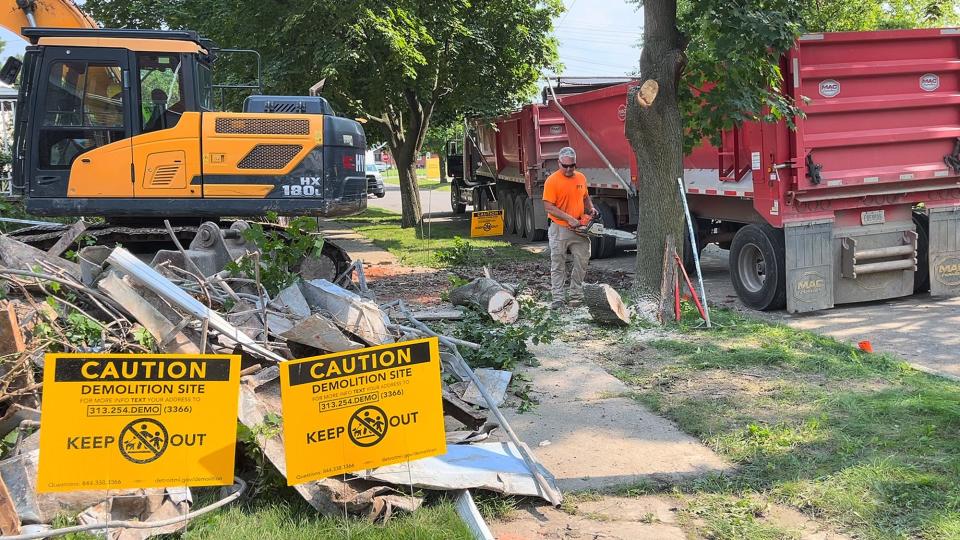
"I still didn't believe," Taylor told me last week.
I drove by shortly after Taylor called to see for myself. I cruised past a couple more times and the signs were there — but so was the house.
On July 2, 2021, I sent a text to a contact in City Hall, informing them the house was open to trespass, the roof was caving in and the porch had collapsed.
"A WONDERFUL octogenarian lives next door and has been staring at the s---pile for years," I wrote. "I would LOVE to give her a date to look forward to when the city expects to knock it down."
My contact wrote back: "It has been cleared for abatement and is ready for knock. So it should be coming down in the next couple of weeks."
On July 21, 2021, I decided to drive by on the way home from recording my podcast. What I saw when I turned onto Eastlawn may have been the happiest day I had experienced since giving up journalism for politics: A backhoe was scooping up what was left of the house.
After shooting some video — making sure the ML4DETROIT lawn sign Taylor had placed in her front yard was prominently featured — I knocked on Taylor's door and asked how she felt.
"Happy," she said. "Very happy. One of my best days, because I've been waiting for this day for years."
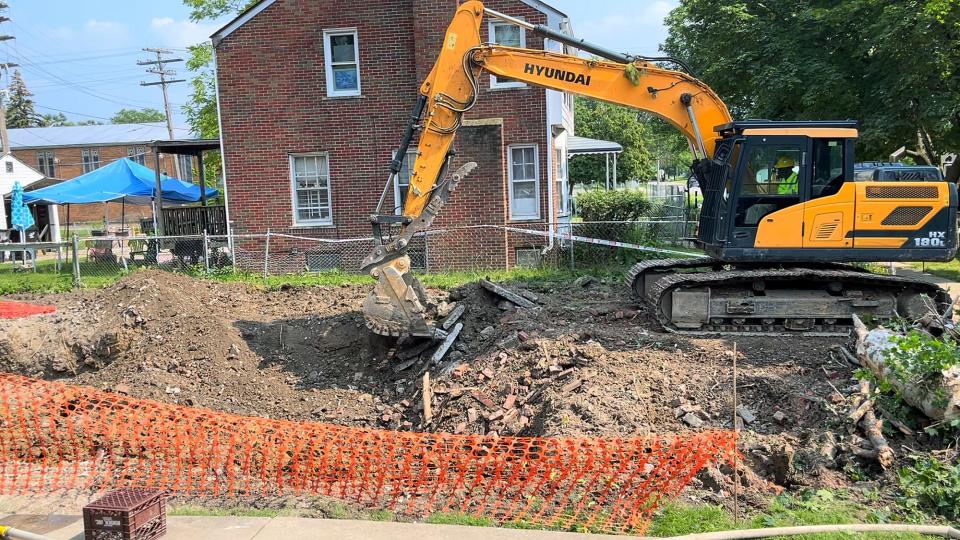
When I called Taylor last week and interviewed her for this column, she recalled: "I really didn't believe it until they came out. Even after they put the signs up. Because they had put the tarp on the top and boarded the windows up. Because they had done that before.
"The day that I believed it was the day that they were knocking it down."
A few weeks later, I finished second in the non-partisan primary, allowing me to advance to the general election. I touted my effectiveness on Eastlawn, but I still got waxed by 20%.
But this story doesn't end on election night, gentle reader. We're just about to enter the puzzle palace.
Navigating the maze
One of the Detroit Land Bank's greatest accomplishments may be returning tens of thousands of abandoned lots to the tax rolls by selling them to neighbors for a measly 100 bucks each.
Anticipating the availability of the vacant lot next door, my contact at the Land Bank walked us through the process of setting up an account so Taylor would be ready to pounce. After years of telling her great-grandkids to avoid the property, she was eager to turn it into their personal play lot.
Patience is a virtue, but when you're 90 years old, it's not a luxury. So, on July 25, 2022 — more than a year after the heap was obliterated — I sent a text to a contact at the Land Bank that said: "A wonderful 90-year-old woman who lives next to a house you guys knocked down would like to buy the lot, but says it is still not available for sale and has asked me to help her find out what's going on."
Four days later, my contact told me the property might be caught up in Inner City Contracting's dispute with city officials. In August 2021, a month after the Eastlawn house was demolished, officials couldn't verify that Inner City qualfied as a Detroit-headquartered business, a status that gave it an advantage when bidding for city work. Over the next year, Detroit's Civil Rights Department suspended Inner City's Detroit-headquartered business certification, City Council members split on whether to approve any more work for the contractor and the Detroit Inspector General suspended Inner City from doing work for the city. That meant if there was any unfinished business on one of Inner City's demolition sites, the city could not declare the job completed and make the land available for sale.
In the meantime, Taylor kept getting the grass cut and put a cyclone fence around the vacant lot to stop people from using her driveway to dump their garbage next door.
"It's worth it not to have them going across my property to the vacant lot," she told me last week. "I just took a chance. … I didn't think it was wise, but it made me feel better."
In September 2022, Inner City resolved questions about its headquarters status and resumed working for the city. Two weeks later, my contact with the city said the demolition contractor on the Eastlawn house needed to replace some sidewalks before city inspectors would sign off on the job. By mid-December, the sidewalks were done, clearing the way for the city to let the Land Bank sell the lot.
In January, I asked my contact at the Land Bank if the city had cleared the lot for sale.
"We are expecting to get a bunch of old ones like this back from them soon to push through to the side lot program," my contact wrote back. "We just can't sell it while it is still tied up in a post-demo process."
"Gotcha," I replied. "Mrs. Taylor will be ready when the time comes!"
Four months later, she was still waiting.
So I contacted the Land Bank again and, on May 31, I was told: "It is currently listed for sale and an application from Georgia Taylor is being reviewed."
Six weeks later, on July 10, I reached out to my contact at the Land Bank one more time and was told there was a delay in processing Taylor's application because "a big influx of applications" created a backlog. My call seemed to break the log jam, at least for Taylor.
On July 13, she sent me a text that said, in part: "Hi ML. Just want 2 let you know I'm finally the owner of the beautiful vacant lot next door. Thanks 2 you & all of your hard work. Purchased it yesterday. Thank you so much for not giving up on it. (heart) I'm so happy (smiley face)…"
On July 29, 2023 — more than two years after the hovel next door was torn down and the lot graded — Taylor sent me a video of her great-granddaughter chasing a ball onto the now verdant lot and kicking it back to Taylor.
The video is a little out of focus — and I'm not just saying that because I get a little misty-eyed when I watch it.
Lessons learned
Taylor planted flowers on her new lot, which she walks on for exercise, occasionally sprinkling top soil on low spots to level the ground
"I can't explain it. It felt really good," she said when I asked about her reaction to buying the land that had plagued her mind for so many years. "I called my children and said 'I'm finally the owner of the vacant lot.' And everybody said 'Congratulations!'"
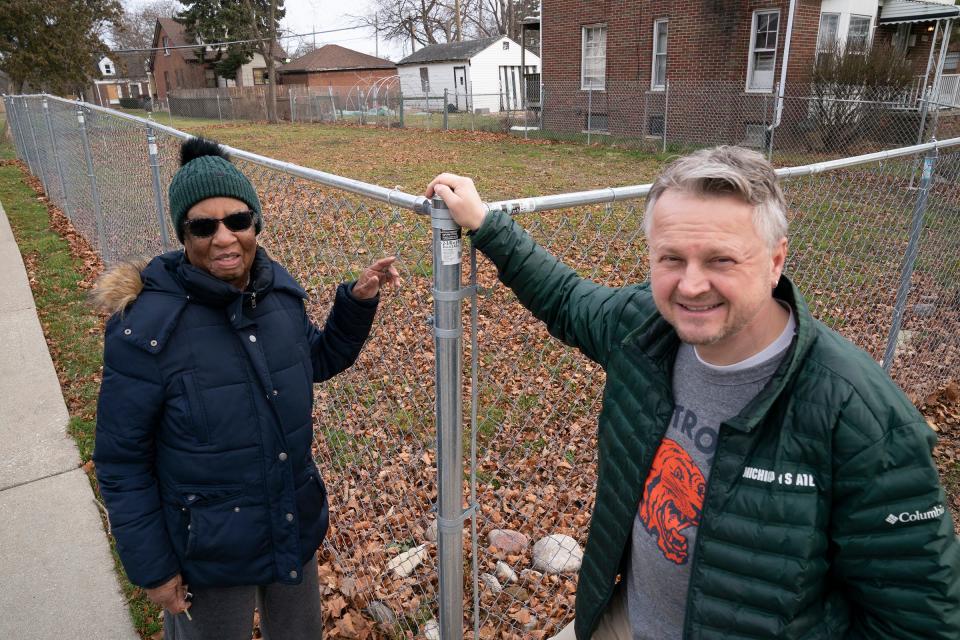
Stephanie Hume, a spokeswoman for the Land Bank, said Taylor's path to ownership "had some twists and turns." She said side lots sales are typically much more straight forward affairs.
I saw Taylor Thursday, and it's hard to believe she will be 92 next month. When I asked her what advice she has to offer after spending seven years fighting to turn a hovel into a little slice of heaven, she said: "You just can't give up. You've got to keep calling and keep trying."
I can't wait to see what she plants this spring.
A long road to nothing ... finally!
Georgia Taylor fought for seven years to get the abandoned home next door demolished. Today, she owns the vacant lot where the house stood. She put up a fence, planted flowers and plays with her great-grandchildren there. Here are some key dates in the property's journey from public property to Taylor territory.
Dec. 21, 2016: House is inspected and determined to be salvageable. Under control of the Wayne County Treasurer.
Jan. 13, 2017: Detroit Land Bank acquires house.
Sept. 6, 2017: Non-profit acquires house.
Jan. 17, 2018: Nonprofit determines house can't be rehabbed and begins planning for demolition.
Dec. 11, 2018: Land Bank takes house back.
March 2, 2019: Land Bank inspects the house and determines it should be demolished.
July 28, 2019: City of Detroit boards up the house.
May 15, 2021: Neighbor Georgia Taylor tells City Council candidate M.L. Elrick she wants the house demolished; Elrick tells the Land Bank the house is open to trespass and the roof is gone.
July 20, 2021: The house is demolished.
July 29, 2021: Land Bank says the now vacant lot is still not available for sale and may be hung up in dispute involving a demolition contractor
Sept. 13, 2022: Demolition contractor cleared to resume working for the city.
Jan. 19, 2023: Lot is still awaiting city clearance and not available for sale by Land Bank.
May 31: Land Bank says Taylor's application to buy the lot is being reviewed.
July 10: Land Bank says influx of properties delayed the processing of Taylor's application, but she was sent an email requesting a money order to complete her purchase of the lot.
July 12: Taylor finalizes the purchase of the lot.
M.L. Elrick is a Pulitzer Prize- and Emmy Award-winning investigative reporter and host of the ML's Soul of Detroit podcast. Contact him at mlelrick@freepress.com or follow him on Twitter at @elrick, Facebook at ML Elrick and Instagram at ml_elrick.
This article originally appeared on Detroit Free Press: Detroit woman spent years fighting for vacant lot next door

